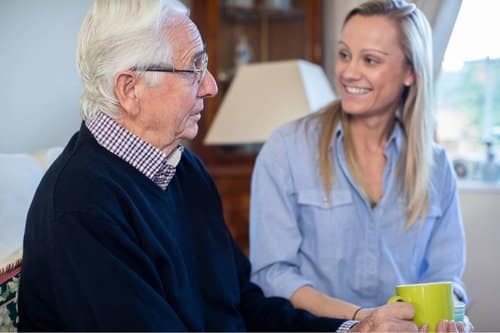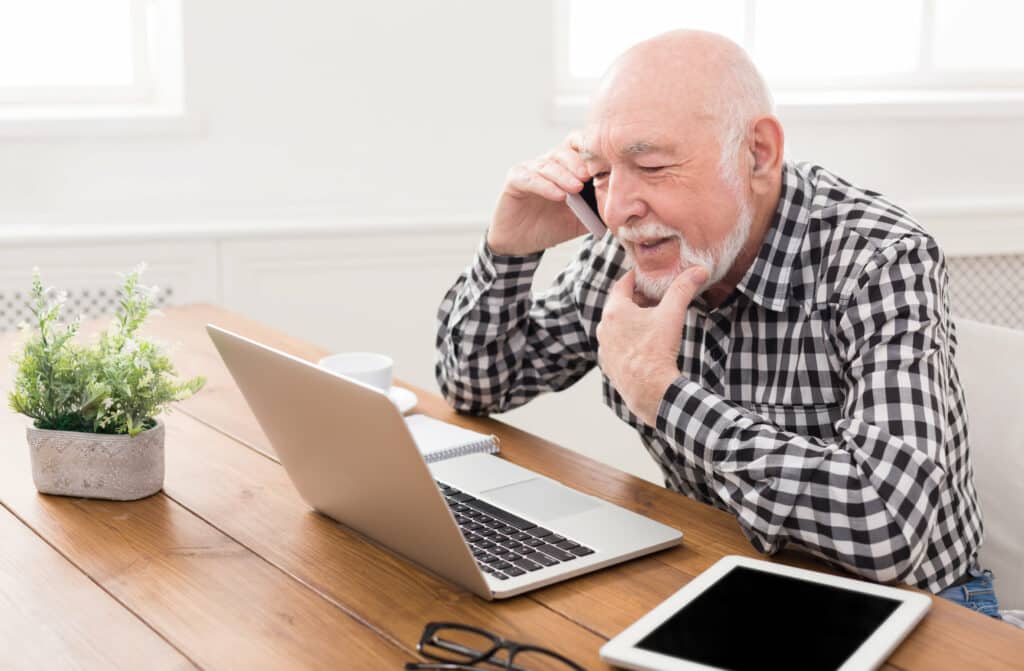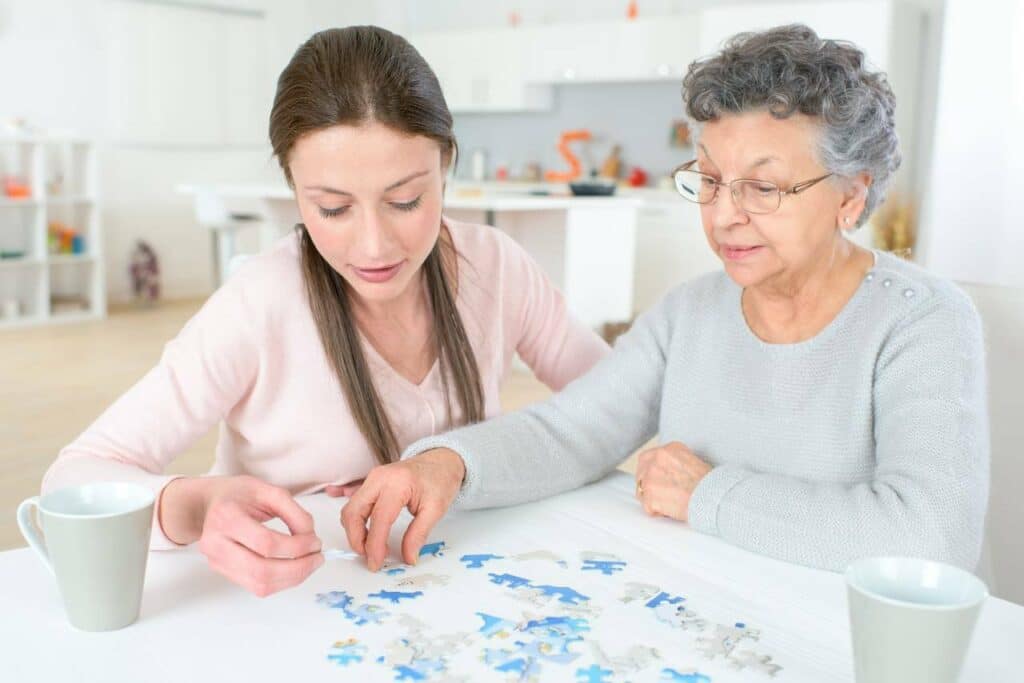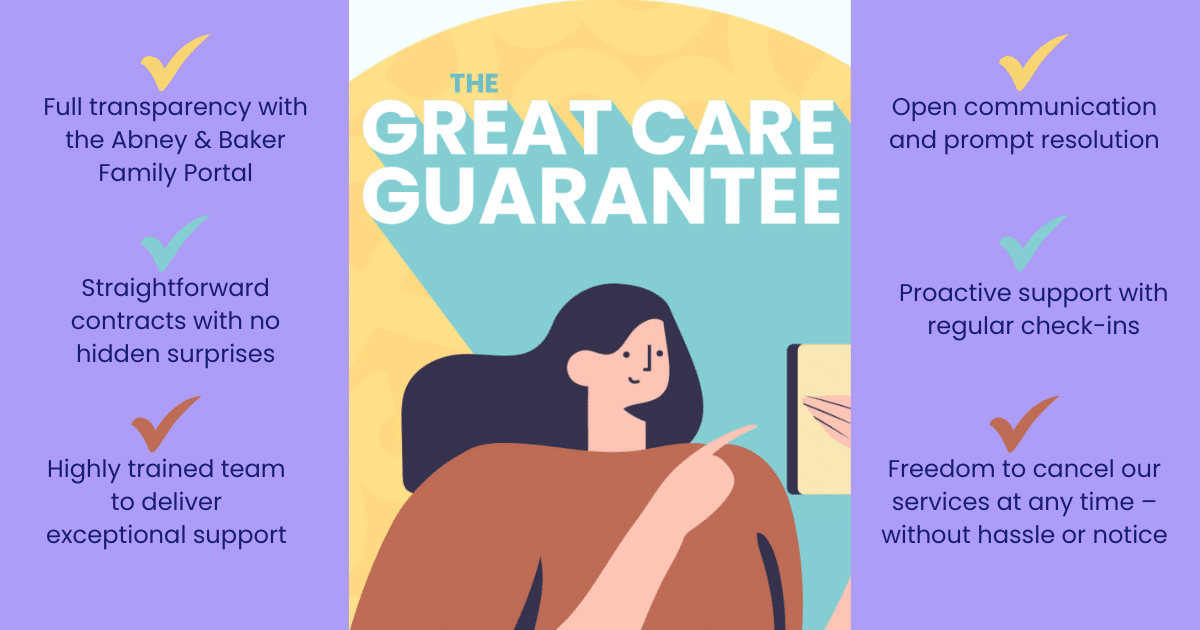You or a loved one may have a diagnosis of Dementia. Or may have started showing early signs, but what is Dementia, and what impact can it have?
Here we take a look at what help is around to ensure you or your loved one can continue living a happy, safe and fulfilling life at home. Plus, what other support and resources are out there to help you.
What is dementia?
Dementia is a syndrome (a group of related symptoms). The symptoms are all associated with the ongoing decline of parts of the brain.
This may include problems with:
The Alzheimer’s Society have created this really useful video summarising what dementia is (and isn’t!).
- Memory loss
- Thinking speed
- Mental sharpness and quickness
- Language
- Understanding
- Judgement
- Mood
- Movement
- Difficulties carrying out daily activities
What is the difference between Alzheimer’s disease and Dementia?
Are there different types of dementia?
Alzheimer’s disease is the most common type of Dementia, but other types include:
Vascular Dementia: the second most common type of Dementia. This causes problems with blood supply to the brain.
Mixed Dementia: usually Alzheimer’s disease and Vascular Dementia.
Dementia with Lewy bodies: Lewy bodies are tiny deposits of a protein. These appear in nerve cells in the brain.
Frontotemporal Dementia: covers a wide range of different conditions. It is sometimes called Pick’s disease or Frontal Lobe Dementia. ‘Frontotemporal’ refers to the lobes of the brain that get damaged in this type of dementia.
Alzheimer’s Society explains what each type of Dementia is in more detail if you’d like to find out more.

Alzheimer’s disease tends to start slowly and build-up gradually. The brain cells get destroyed over time and the symptoms sadly do too. This starts to interfere with a person’s mental health and daily life.
Vascular Dementia can happen after a stroke or TIA (mini stroke). Both are a common cause of dementia, often progressing in ‘stepped’ ways. This means symptoms are stable for a while and then suddenly get worse.
It’s important to remember different people suffer with different signs of dementia. We are all unique, lots of things can affect the signs you see. These include the person’s attitude to their diagnosis and their physical health. Other factors include the relationships they have with friends and family members. Plus, the treatment and support they get, and their surroundings.
What are the symptoms of Dementia?
- People with Dementia can become apathetic or uninterested in their usual activities. Or, they may have problems controlling their emotions.
- They may also find social situations challenging and lose interest in socialising. Aspects of their personality may change.
- A person with Dementia may lose empathy (understanding and compassion). They may see or hear things that other people do not (hallucinations).
- Dementia affects a person’s mental abilities. They may find planning, problem solving or organising complicated. Maintaining their independence may also become a problem.
- Short-term memory can be affected. Forgetfulness and misplacing of items is common. This can disrupt a normal part of their daily routine. Like reminding them how to switch the TV or kettle on, or where they left their keys.
- Dementia can be a secondary illness. It sometimes accompanies Parkinson’s disease and Huntington’s disease.
- People with Dementia may lose the ability to remember events, or fully understand the environment or situations. It also can look as if they’re not telling the truth or are wilfully ignoring problems.
Can I continue to live at home safely with dementia?
If you have been diagnosed with Dementia, it’s important to remember that:
You’re still you, even though you have problems with memory, concentration and planning.
Everyone experiences Dementia differently.
Focusing on the things you can still do and enjoy will help you to stay positive.
If you have Dementia you will usually need extra help. It can be pretty daunting when you start looking at the options available to you. But, it is absolutely possible to live a happy, fulfilling and safe life at home. Download your Guide to Care at Home. Discover more about the services, and what care at home can provide. The benefits of extra support and how to find the right care provider for you.
Equipment and home adaptations:
Equipment and making adaptations to your home can help your independence for longer. These can range from using the stairs to taking medication. Alzheimer’s Society provides a great hub of information. They explain the different types of equipment available.
The Alzheimer’s Society has also created a useful guide to how best to access equipment. This includes social services funding, what the NHS can provide. From grants and help available from local authorities and top tips when sourcing equipment.
If you are considering getting equipment for yourself or someone you know, you should seek advice from professionals. This can be from an Occupational Therapist, Physiotherapist, District Nurse or Continence Adviser. The best first port of call is to get in touch with your GP who can then refer you to the most appropriate person.
These adaptations can help you stay independent and can offer your family and carers the reassurance that you are safe in your own home.
Dementia-friendly care at home:
We’re pleased to say that our carers receive specific dementia training which helps them to truly understand and support our clients with dementia. They go through the Memory Care Training Pathway which sets the foundation for care centred around your individual needs. The foundation training explores the journey through cognitive impairment including a tour of the brain, understanding distressed behaviour and lots more. All this training helps our carers genuinely understand the effects of Dementia both on the client themselves and their families.
All our carers are Dementia Friends too. This is an Alzheimer’s Society’s programme which aims to change people’s perceptions of Dementia. It sets out to transform the way the nation thinks, acts and talks about the condition. Don’t forget to download your Guide to Care at Home where you can discover how a little support from the right team can help to stay safe and happy in your own home.
“We welcomed our care worker into our home on Monday and Friday as usual. My husband, who has advancing Alzheimer’s disease, was so pleased to see her, like an old friend. I was then able to catch my bus into town for my keep fit class. Then meet friends for coffee with the knowledge he was in safe hands. This gave me peace of mind and time out, which I valued. Our friends recommended the service, and I would have no hesitation to do the same.”
What information and resources are available?
There are a large number of organisations, resources and tools available to support someone with dementia. We’ve selected our top pick below to help you sift through all the information out there.
Help & support organisations:
Alzheimer’s Society National Dementia Helpline: 0300 222 1122 (9am–8pm Mon–Wed, 9am–5pm Thur–Fri, 10am–4pm Sat–Sun)
Age UK: provide information and advice for older people. 0800 169 8787 (general enquiries) / 0800 678 1602 (advice line)
British Red Cross: offers a range of services – including care in the home, wheelchair loan and transport assistance. 0344 871 1111
Disabled Living Foundation: provides information about finding some simple solutions, such as mobility aids. 020 7289 6111 (enquiries, 9am–5pm weekdays) / 0300 999 0004 (helpline, 10am–4pm weekdays)
Royal College of Occupational Therapists: provides details of independent occupational therapists in your area. 020 7357 6480.
Home improvement agencies: Home improvement agencies, also known by names such as Care and Repair or Staying Put, offer free advice and information to older and disabled homeowners who want to stay in their own homes but may need specialist equipment or adaptations in order to do so. There are over 200 home improvement agencies at present. To find out if there is one within your local authority, contact Foundations on 0300 124 0315.
Resources:
The Dementia Guide – Living well after diagnosis: The guide will help you understand dementia. Treatments, support and services that are available. Including information about how you can live as well as possible with dementia about making plans for the future.
The memory handbook: For people with mild memory problems. It contains information about memory problems and practical strategies on how to live well with them.
What is Dementia guide: Covers symptoms, what causes Dementia? who gets Dementia? how can I tell if I have Dementia? diagnosing Dementia, how Dementia is treated? can Dementia be prevented ? And more.
Guide to Care at Home: Our own guide introducing care at home. This is a clear, simple way for you to find care at home. Including what it involves, the benefits it can bring and how to go about finding the right care provider.
A practical guide for caring for someone with dementia: Are you the main person supporting someone with Dementia? This guide is for you. It will tell you more about their condition and how it can affect them over time.
Alzheimer’s disease – Understanding your diagnosis: To help you to understand more about the condition and how it can affect you.
The progression of Alzheimer’s disease and other Dementias guide: Each person experiences Dementia in their own way. But the way the condition progresses can be in a series of stages. This guide outlines the characteristics of the early, middle and late stages of Alzheimer’s disease. It briefly looks at how other forms of Dementia progress.
Dementia together magazine: Alzheimer’s Society magazine produce this six times a year. The magazine is for all in the dementia movement and anyone affected by the condition.
Dementia connect: an online tool by Alzheimer’s Society. Helping find relevant information and support for memory loss. Also, dementia specific to your situation.
Worried about memory loss guide: Everything for memory problems. With help, and what you can do next if you’re concerned.
Dementia-friendly online activities:

Jigsaw puzzles: Lots of people enjoy jigsaw puzzles. They can be a fun activity for people living with Dementia, providing they’re not too difficult. Some websites, such as JIGIDI offer free online puzzles. The can even transform your old photos into puzzles. Great for triggering memories and conversation. Alzheimer’s Society also have a selection of
Dementia-friendly jigsaws available in their shop.
Dementia-Friendly online colouring books: Online colouring works well on tablets and touchscreen devices. These are easy to tap and fill the white spaces. This is particularly useful for people in the later stages of the condition. Using a pen, pencil or computer mouse may no longer be possible. There are many websites offering free online colouring.
Online videos: YouTube is another great source of entertainment. The website’s huge archive of older videos is great for reminiscing, whether it’s old music, TV or sports. Whatever a person’s interests, you’ll find plenty of choice available to browse and search.
Online games: ‘Brain training’ games are popular with people in the early stages of Dementia. Also, those that worry about their memory. Aside from ‘training’ the brain. Online games can be simply good fun for people living with Dementia. App stores and websites are full of free games and puzzles. Have a look for something that matches the person’s interests.
Music playlists: Playlist For Life is a website specifically designed for people living with Dementia. There’s also a huge collection available on Spotify. Try using online assistants such as Alexa, Siri or Google Home. These are all capable of lots more than music.
Social activities & support groups:

Keeping in touch with people and engaging in social activities, such as going to the theatre or cinema is good for you. Try being part of a walking group or choir, these are great for your confidence and mental wellbeing.
Many communities are now dementia friendly. For example, cinemas put on Dementia-friendly screenings of the latest films. Leisure centres run dementia-friendly swimming sessions as well as other activities.
It’s a good idea to join a local Dementia-friendly group, perhaps at a memory café or community centre. You can share experiences and use tips from others who are living with Dementia.
What are the next steps?
If you suspect you or a loved one has Dementia, the first step is to speak to your GP. Although there is no cure for Dementia at present. If it’s diagnosed in the early stages, there are ways you can slow it down and maintain cognitive function.
A diagnosis can help get the right treatment and support for Dementia. It helps everyone involved to prepare and plan for the future. With treatment and support, many people are able to lead active, fulfilled lives. And, all in the comfort and reassuring surrounding of their own homes.
If you’d like to chat to us about how a little extra care and support at home from a Dementia-friendly provider can help. Please get in touch below or download your Guide to Care at Home.
We are always here to chat through any queries or questions you have.
Sources: NHS, Alzheimer’s Society, Age UK, Dementia Action Alliance, Dementia Friends.
Helping your loved one to continue living independently and confidently in their own home.
By providing a range of support at home, we’re helping many clients across Bath & North East Somerset and West Wiltshire retain their independence and stay in control in the comfort of their own homes.
Remember we’re always here if you want to chat about your care options. Just get in touch:
Call 0333 043 4880 – Email enquiries@abneyandbaker.com – Book a call here














